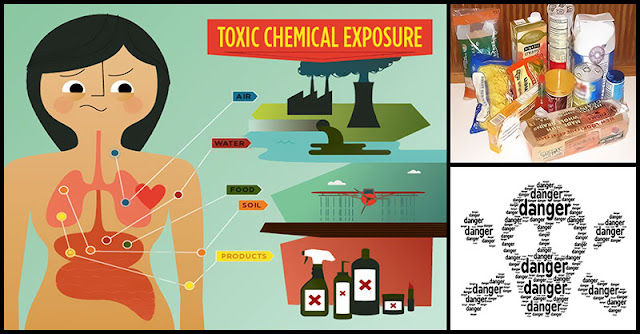Serious fatal complications can be caused by any poison at any dose if taken for a long period of time. When we talk about poison, it has no safe dose because the body recognizes even the smallest dose and immediately creates inflammatory cascades and immune responses to combat these foreign entities. Every facet of our lives, from schools to our workplace, are invaded by toxic chemicals, which deteriorates every single system in our bodies and causes many diseases.
Here’s How Chemicals Are Affecting Every System In The Body:
HEART
FURRED-UP ARTERIES:
Studies have shown that poor air quality raises the risk of heart diseases because it causes thickening of the arteries.
HEART DISEASE:
According to researchers at the Peninsula Medical School in Exeter, Bisphenol A (BPA), the ingredient used in plastic food and drink packaging, increases the risk of heart disease and diabetes.
BRAIN
DEMENTIA:
Lead increases the risk of dementia. Consider replacing your lead pipes at home, and always run the cold tap for a few minutes before using water for drinking or cooking, because lead leaches into the water when it is left sitting.
AUTISM:
Many agricultural pesticides contain organophosphates, which increase the risk of autism. Some people are more susceptible to neural damage when exposed to this chemical.
DEVELOPMENTAL DELAY:
Mercury and polychlorinated biphenyls or PCBs – both found in seafood, are other neurotoxins that can harm the brain. Children who have eaten large amounts of contaminated fish may have difficulty in concentrating and lower IQs.
BREASTS
CANCER:
Studies found a link between breast cancer and phthalates, which is a genderbending chemical widely used to soften plastics and stabilize fragrances. Phthalates are still widely used. It can be found in shoes, vinyl floor coverings, shower curtains, plastic furniture, and many other household goods.
DIGESTIVE SYSTEM & LIVER
Arsenic can cause cancer, digestive problems, and diabetes. This poisonous chemical is also associated with hearing loss and disorders of the nervous system. It can be found in waters used to irrigate rice crops.
LIVER CANCER:
Polychlorinated biphenyls, or PCBs, increase the risk of liver cancer, according to animal studies. PCBs were commonly found in paints, adhesives, and plastics until the Seventies. At present, they can be found in fish and seafood. It was also revealed by other tests that old fluorescent lights may leak small amounts of PCBs.
LUNGS & IMMUNE SYSTEM
ASTHMA:
According to researchers at Bristol University Bleach, air fresheners, window cleaner, furniture polish, and carpet cleaners are all linked to asthma and wheezing. The chemicals present in these products can increase the risk of persistent wheezing. Avoid products that come in a spray because they become airborne and is breath in.
Chlorine in swimming pools can also trigger asthma and lung damage. Harmful chloramines are created once chlorine interacts with sweat, skin cells and other proteins shed by swimmers.
LOWERED IMMUNITY:
Results of a number of studies have revealed that stain repellents, non-stick cookware, and waterproof clothing, upholstery, and carpets could affect our immunity because they contain agents called perfluorinated chemicals (perfluorooctanoic acid PFOA, Perfluorooctanesulfonamide PFOSA and perfluorooctane sulfonate PFOS).
CANCER:
A person’s exposure to agricultural pesticides increases his risk of lymphoma, which is a blood cancer associated with the immune system. The increased risk is estimated to be 65 percent.
SEXUAL ORGANS
INFERTILITY:
Fire retardants known as PBDEs can be found in your TV, laptop, or carpet. According to research, women exposed to PBDE took longer to become pregnant.
SKIN
DERMATITIS:
Sodium lauryl sulfate – a foaming agent used in cosmetics, skin-care products, toothpaste, and shampoo – causes cancer. A number of studies have shown that it is a skin irritant and can cause contact dermatitis. Switch to a product that has no SLS and is free from lanolin and fragrance, which can also cause irritation.
BLADDER & KIDNEY
CANCER:
Bacon and other meats are preserved with the help of sodium nitrate, which creates nitrosamines -chemicals which have been linked to an increased risk of bladder cancer. Switch to organic nitrate-free bacon for you to reduce your exposure.
U.S. researchers warned that women who use permanent hair dyes at least once a month are up to three times more likely to develop bladder cancer. Hair colourants have shown to have para-phenylenediamine or PPD, that is linked to genetic damage and cancer. Switch to a herbal dye or semi-permanent to minimize your exposure.
Benzene, which is a chemical found in furniture wax, detergents, glues, and paints, is particularly toxic to the kidneys. Benzene can increase the risk of renal cancer in men. High levels of exposure to this can also damage the brain, lungs, and liver. Benzene can also be formed in soft drinks when two otherwise harmless ingredients – vitamin C and either sodium benzoate or potassium benzoate (both preservatives) – are combined.









